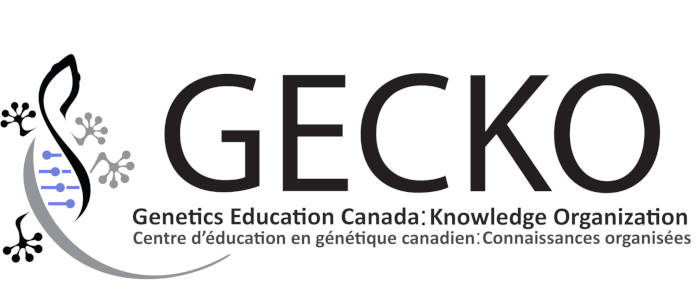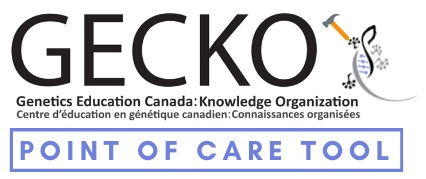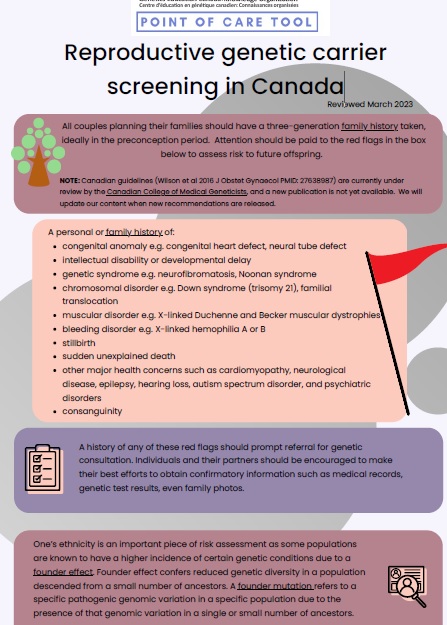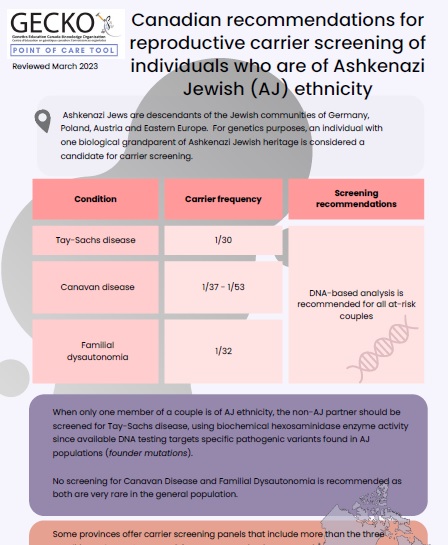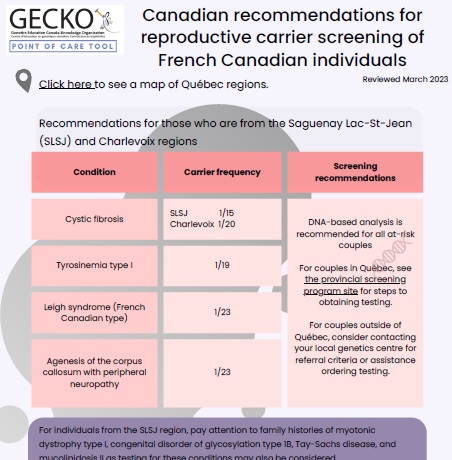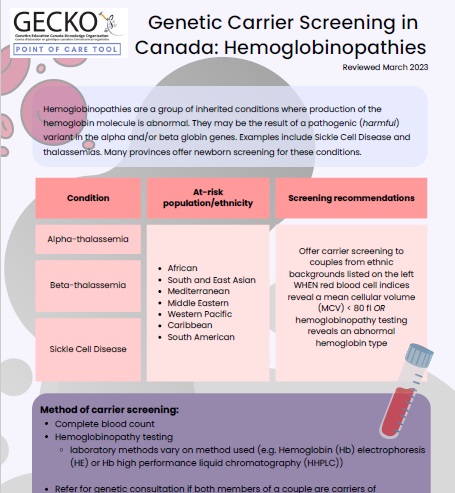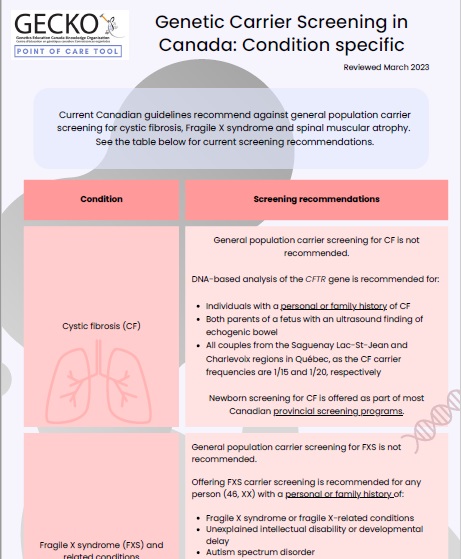All couples planning their families should have a three-generation family history taken, ideally in the preconception period. Attention should be paid to the red flags below to assess risk to future offspring.
NOTE: Canadian guidelines (Wilson et al 2016 J Obstet Gynaecol PMID: 27638987) are currently under review by the Canadian College of Medical Geneticists, and a new publication is not yet available. We will update our content when new recommendations are released.
Reviewed June 2023
We have developed five (5) point of care tools to assist clinicans in assessing individuals and couples and their eligibilty for carrier screening as per current Canadian guidelines. Download the full suite of tools, those for Ashkenazi Jewish ancestry, French Canadian ancestry, Hemoglobinopathies or Condition specific recommendations (i.e. Fragile X syndrome, cystic fibrosis and spinal muscular atrophy).
Red Flags
A personal or family history of:
- congenital anomaly e.g. congenital heart defect, neural tube defect
- intellectual disability or developmental delay
- genetic syndrome e.g. neurofibromatosis, Noonan syndrome
- chromosomal disorder e.g. Down syndrome (trisomy 21), familial translocation
- muscular disorder e.g. X-linked Duchenne and Becker muscular dystrophies
- bleeding disorder e.g. X-linked hemophilia A or B
- stillbirth
- sudden unexplained death
- other major health concerns such as cardiomyopathy, neurological disease, epilepsy, hearing loss, autism spectrum disorder, and psychiatric disorders
- consanguinity
A history of any of these red flags should prompt referral for genetic consultation. Individuals and their partners should be encouraged to make their best efforts to obtain confirmatory information such as medical records, genetic test results, even family photos.
One’s ethnicity is an important piece of risk assessment as some populations are known to have a higher incidence of certain genetic conditions due to a founder effect. Founder effect confers reduced genetic diversity in a population descended from a small number of ancestors. A founder mutation refers to a specific pathogenic genomic variation in a specific population due to the presence of that genomic variation in a single or small number of ancestors.
Other considerations:
- There is a higher incidence of hemoglobinopathies in certain populations. Screening recommendations can be found here.
- Canadian recommendation for reproductive carrier screening in individuals of Ashkenazi Jewish ethnicity are here, and those from certain regions of Québec can be found here.
- Canadian carrier screening recommendations for cystic fibrosis, fragile X syndrome and spinal muscular atrophy can be found here.
- Individuals who are of Cree ancestry have a higher carrier frequency of Cree encephalitis (1/30-1/17) and Cree Leukoencephalopathy (~1/10). Screening programs have been developed in some regional communities. The CE-CLE Screening Program is offered to adults in the Awash clinics and to high school students.
- Aboriginal Manitoba populations have a higher incidence of cerebro-oculo-facio-skeletal syndrome
- Newfoundland populations have a higher incidence of Bardet-Biedl syndrome and neuronal ceroid lipofuscinosis.
- A maternal family history of bleeding disorders in male relatives (father, brother, and/or maternal uncles) should prompt referral for consideration of carrier screening of X-linked hemophilia.
- Families of Amish, Mennonite, or Hutterite background based on family history and/or geographic or religious settlement locality, in addition to a three-generation family history, should be offered referral for genetic consultation.
Expanded carrier testing is privately available genetic testing which screens an individual for more than just guideline/ethnicity-based conditions. See our Education Module for more information on this type of testing.
Resources
[Accessed April 2023]
- Ordering Ashkenazi Jewsish carrier screening in Canada
- The National Council of Jewish Women of Canada
- Jewish Genetic Disease Consortium
- Dépistage et offre de tests de porteur en Québec: Offre de tests de porteur pour quatre maladies héréditaires récessives chez les personnes originaires des régions du Saguenay–Lac-Saint-Jean, de Charlevoix et de la Haute-Côte-Nord
- Thalassemia Foundation of Canada
- The Sickle Cell Disease Association of Canada
- Sickle Cell Awareness Group of Ontario
- Cystic Fibrosis Canada
- Fragile X Research Foundation of Canada
- Cure SMA Canada
- Muscular Dystrophy Canada
-------
Disclaimer:
· GECKO is an independent not-for-profit program that does not accept support from commercial or non-academic entities.
· GECKO aims to aid the practicing non-genetics clinician by providing informed resources regarding genetic/genomic conditions, services and technologies that have been developed in a rigorous and evidence-based manner with periodic updating. The content on the GECKO site is for educational purposes only. No resource should be used as a substitute for clinical judgement. GECKO assumes no responsibility or liability resulting from the use of information contained herein.
· All clinicians using this site are encouraged to consult local genetics clinics, medical geneticists, or specialists for clarification of questions that arise relating to specific patient problems.
· All patients should seek the advice of their own physician or other qualified clinician regarding any medical questions or conditions.
· External links are selected and reviewed at the time a page is published. However, GECKO is not responsible for the content of external websites. The inclusion of a link to an external website from GECKO should not be understood to be an endorsement of that website or the site’s owners (or their products/services).
· We strive to provide accurate, timely, unbiased, and up-to-date information on this site, and make every attempt to ensure the integrity of the site. However, it is possible that the information contained here may contain inaccuracies or errors for which neither GECKO nor its funding agencies assume responsibility.
